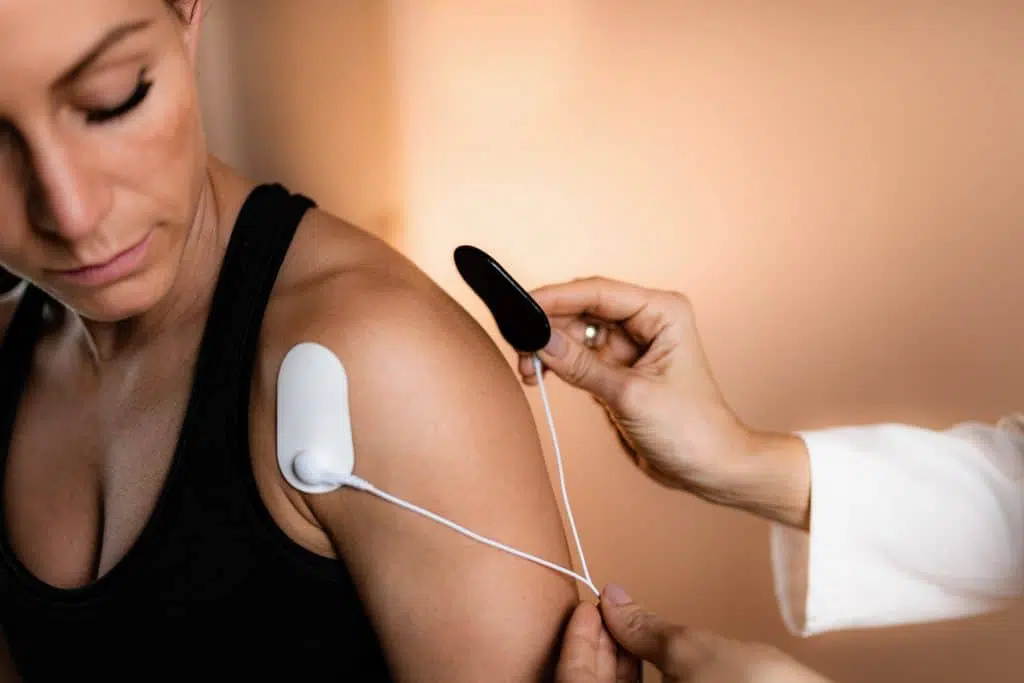Call Now!
Torrance Office: +1 (424) 360-0155

Inflammation of the biceps tendon or rotator cuff is shoulder tendonitis. Muscles in the upper arm (biceps) are attached to your arm bones with strong, flexible tendons. These tendons also connect the upper arm muscles to your shoulder joint.
The rotator cuff is part of your shoulder joints and consists of intertwining tendons and muscles. Rotator cuffs connect upper arm bones directly to the shoulder blades. Without a normally functioning rotator cuff, it would be impossible to move or rotate your arm.
When should tendons and muscles suffer from overuse or misuse, inflammation may occur, causing shoulder pain, stiffness and reduced range of emotion. Inflammation is a physiological response to external and internal tissue damage. Strained, sprained or torn shoulder muscles and tendons receive a flood of white blood cell chemicals meant to protect and heal tissues. This immune system response also increases blood flow to the shoulder, which produces the warmth, swelling and redness of areas of inflammation. Whenever a high amount of white blood cells invade joint components, nerves become irritated and hypersensitive to the chemical processes going on around them. The result is pain, soreness and possible radiating pain affecting other parts of the body.
Rotator cuffs contain tiny "sacs" (bursa) filled with special fluid to act as cushions between muscles and tendons and shoulder bones. Like shoulder tendinitis, shoulder bursitis occurs when bursa are inflamed by straining and overusing the shoulder muscles. You can have shoulder bursitis and shoulder tendonitis at the same time or separately.
You may be at risk for suffering symptoms of shoulder tendonitis or bursitis if:
Osteoarthritis is a common reason why seniors seek Torrance shoulder tendinitis treatment. Muscles, tendons and ligaments eventually get worn down with age, reducing the ability of your shoulder joint to move smoothly and easily. Professional athletes and workers in careers demanding repetitive use of the arms and shoulders often have symptoms of premature osteoarthritis beginning in their middle to late 30s.
Rolling Hills Medical chiropractors in Torrance can reduce shoulder pain and stiffness using a variety of nonsurgical physical and chiropractic therapies. Adjustments, physiotherapeutic techniques, and massage therapy rapidly promote healing of shoulder tendinitis and bursitis and improves shoulder strength and flexibility by encouraging natural absorption of scar tissue.

Torrance shoulder tendonitis treatment at Rolling Hills Medical also works to remove pressure off-shoulder nerves affected by tissue inflammation. Decompression therapy, ultrasound, and electrical stimulation therapy not only gives you rapid pain relief but also increases the range of motion so you can move your arms and shoulders more freely without experiencing pain.
We also offer radiofrequency/Rhizotomy treatment in the event shoulder pain does not respond to chiropractic or physiotherapy techniques. By applying localized heat to nerves in the shoulder, radiofrequency/Rhizotomy destroys specific nerves responsible for your shoulder pain.
Our medical center has onsite diagnostic testing and consultation services to ensure you receive the best treatment for shoulder tendonitis and shoulder pain. All new patients get their initial consultation free of charge. When you depend on us for the treatment of musculoskeletal disorders, you won't be told you need surgery. Instead, we'll develop a personalized, non-surgical treatment plan to fully address the underlying cause of your joint and muscle pain.
Call today at (424) 267-2491 get your free consultation at Rolling Hills Medical in Torrance.
